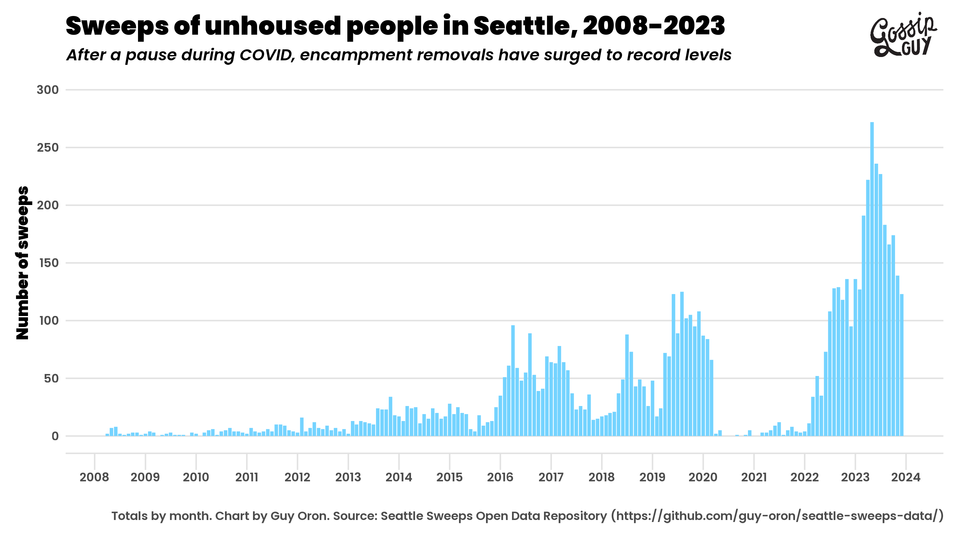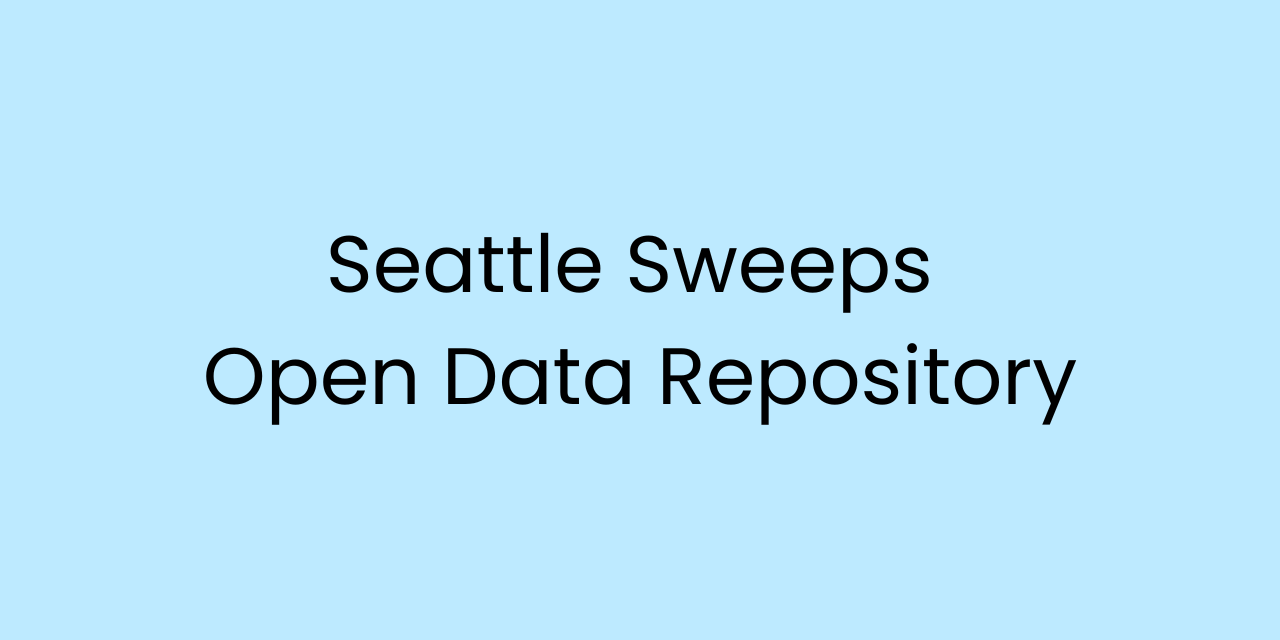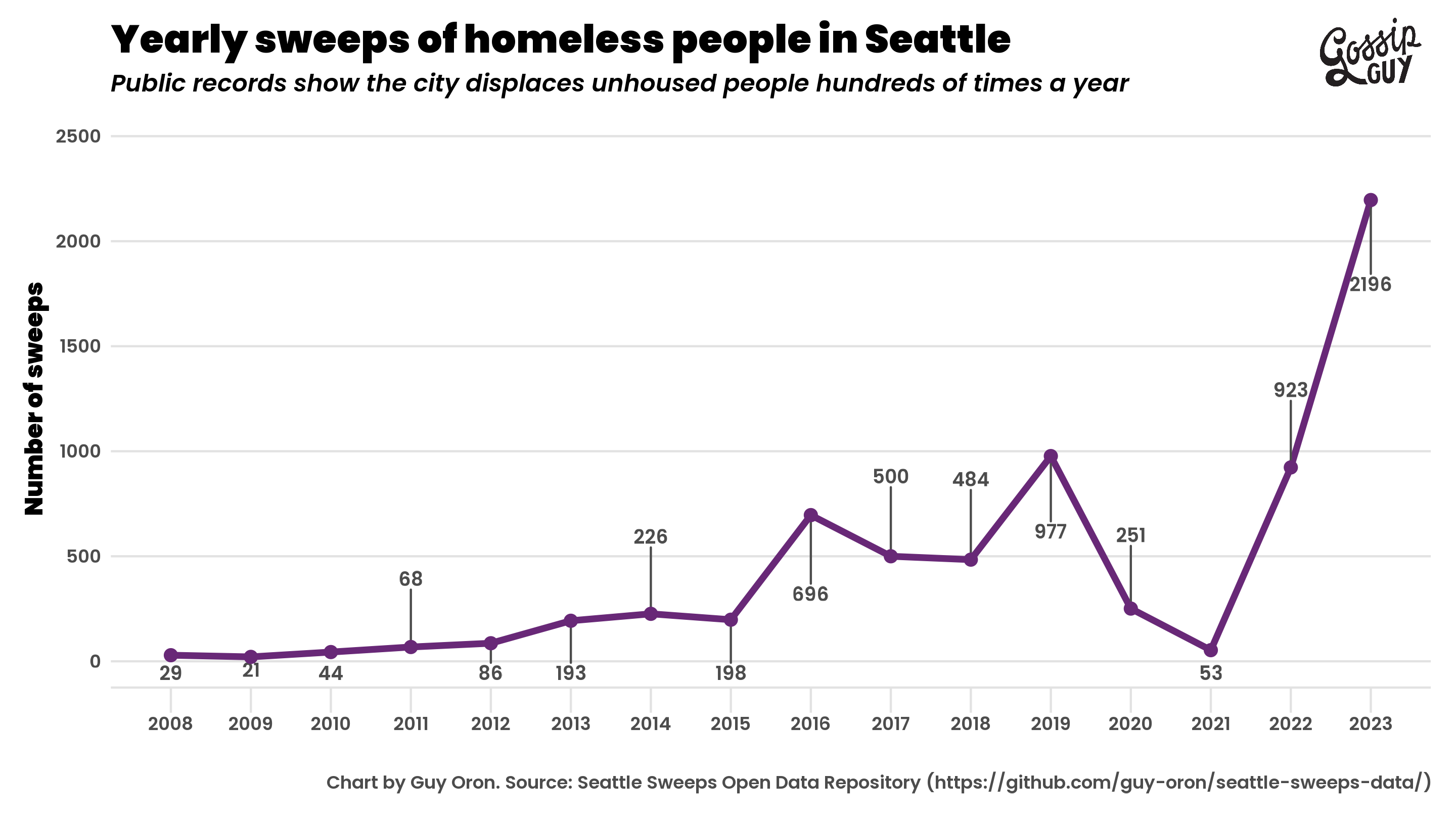Introducing the Seattle Sweeps Open Data Repository

Author’s note: 2024 — what a year. It’s been a lot. And yet we keep going. I’m deeply grateful to all of you for your support of Gossip Guy. Across a dozen posts, 240 of you have decided to subscribe to this newsletter and support local journalism that attempts to hold the powerful accountable and uplifts our communities and social movements. A generous handful of you even decided to become financially supporting members — thank you so much!
You may have noticed that the cadence of these posts has been a lot slower than my initial promise of weekly issues. Many of the projects I’ve taken on, like this one, have been deeper investigations that took a lot of work on the back end. Add to that my full-time job and all the busyness of life … you get the picture. In 2025 I hope to return to a regular schedule, with a goal of at least one post a month. As I revamp the newsletter, I would love to hear your thoughts, ideas and suggestions on what you’d like me to cover as well as what types of projects you are most interested in seeing as a reader. You can reach me directly at gossip@guyoron.net.
This week, the U.S. Department of Housing and Urban Development released a report showing the number of people experiencing homelessness rose by 18% nationwide between 2023 and 2024, with a record number of 770,000 people living on the streets, in tents, encampments, vehicles, shelters and other temporary accommodations. Here in Seattle, we’ve seen a similar increase in homelessness since the start of the COVID-19 pandemic in 2020.
With skyrocketing rents, more people are being priced out of their homes and facing evictions. In response to the increased presence of unhoused people — and their visibility — cities are turning to a common tactic: sweeps.
For years, I have documented the scope and effects of Seattle’s sweeps policies. In many ways, Seattle was an early innovator of this continual displacement strategy in its modern form. By 2016, the city was carrying out an average of nearly two sweeps a day. In the wake of the Supreme Court’s Grants Pass v. Johnson decision earlier this year, many unhoused people fear local governments will only be further emboldened to intensify anti-homeless policies.
A sweep is not simply the forced eviction of a person from where they are sheltering. It is a violent process that can cause suffering and dislocation for people who are already at the margins of society. Many people lose their most valuable belongings. ProPublica, the investigative news outlet, recently published a series on some of the heartbreaking losses unhoused people experienced when displaced.
One of the ways I have tried to understand Seattle’s sweeps policies is by quantifying them. Through public disclosure requests, I received logs created by city officials to track the removals they carry out. I also obtained data on complaints about encampments made to the city by Seattle residents, as well as financial information on how much it spends to implement these policies.
In the past, advocates and researchers have reached out to me about the data, which I shared with them. However, I always felt uneasy being a gatekeeper of these records. After all, they should, by definition, be public.
This is why I have created a new Seattle Sweeps Open Data Repository on GitHub:

GitHub is a cloud-based platform for sharing files, most commonly used by coders to share packages and maintain version control. Through clicking the link above, you can download the records I have obtained, as well as some visualizations and statistical analysis I have done, for free and without having to make an account.
Just scroll to the right hand side of the page under the the about section. There should be section called releases. Just click the v1.o button, which will allow you download the repository as a .zip file. You can also click on specific files and download them individually.
The goal of the repository is to make a publicly accessible portal for the data and invite others to collaborate in the research of Seattle’s sweeps policies. GitHub also enables me to continuously update the repository as I obtain new records.
For example, since my most recent investigation came out in June in Real Change, I received a new, more accurate spreadsheet of sweeps in 2023. This reduced the total count of sweeps for that year from 2,800 to 2,200, mainly due to the removal of site visits that were erroneously classified as removals. Further analysis has also helped me weed out duplicates and errors from sweep logs from prior years.

The repository contains data from sweeps conducted between 2008 and 2023. I have to give a special thanks to former Real Change editor Aaron Burkhalter, who graciously allowed me to upload the records he obtained from 2008 to 2017.
Another benefit of the Seattle Sweeps Open Data Repository is that it allows you to read through my code, audit my work and catch any issues or bugs. Because the documents were created with no intent for publication, they likely contain errors. Any totals should be treated as estimates and not precise figures.
I have included two charts that I made with the coding language R along with the repository, which are featured in this post. Please feel free to use the data for your own visualizations!
In the future, I plan to add figures from 2024 when I obtain them, as well as latitude and longitude coordinates for all sweeps. If you delve into the data, you will see that many of the logs do not include any location coordinates. Adding them will probably require manual data entry.
While politicians choose to hide data sets like these from the public, they publish dashboards to track how few unhoused people's encampments remain standing. I reject the premise that we should let those in power decide what information you get to see. Look through the data and come to your own conclusions on how Seattle treats its residents who are forced to live on the street.
I hope you find this data interesting and useful. See you in the new year!
With gratitude and solidarity,
Guy


Member discussion